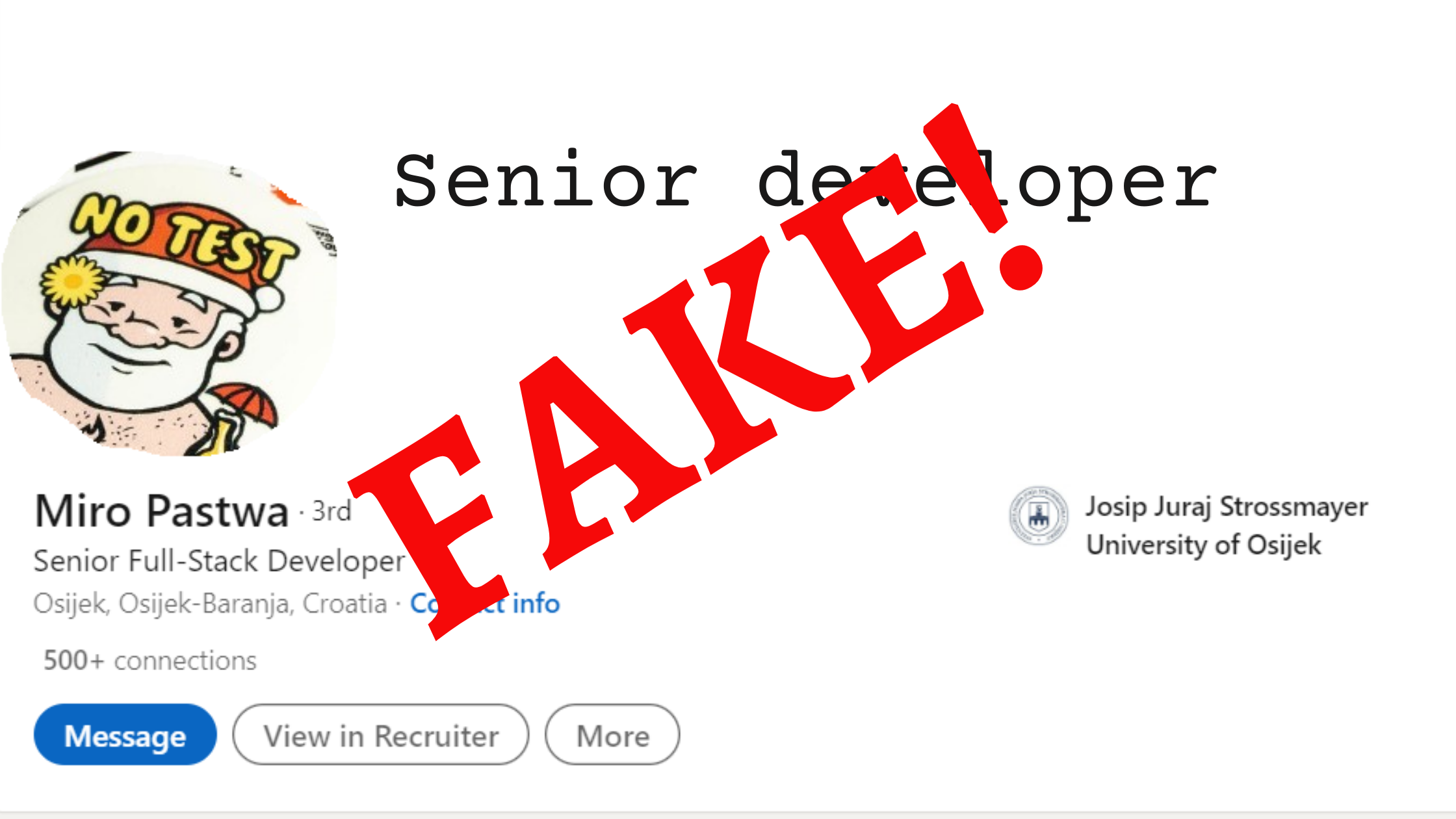How to spot a fake LinkedIn profile – Is it your perfect candidate, or is it a sham?

Dear fellow recruiters in the IT sector, do you feel like your work has become harder during the remote work era? It has brought on some perks – like avoiding the commute, being able to live on the coast but work for a company based in Zagreb or just working from your pyjamas for the first hour on those really sleepy days. But it has also brought on challenges in areas of maintaining company culture, staying connected with your colleagues and ensuring effective communication.
Still, one of the biggest impacts is the increased demand for developers while the candidate pool stays the same. Every recruiter works very hard to find a candidate whose skills are on point, who fits in the company culture and has financial expectations that are in line with the budget.
Often our days are filled with looking over countless more or less poorly written LinkedIN profiles (sorry devs, but you know it is true), scraping together to write personalised messages with barely any information and then being ignored. Every recruiter will recognize the feeling of excitement when you see a detailed profile that perfectly matches your requirements. Sometimes it feels like winning a lottery. Until you realise it is FAKE.
This started happening to me a few months ago. I would see a great profile, send out my personalised message and get no reply. Then, I noticed there were a few of those perfect profiles with similar style of writing and profile photos. After that I noticed a pattern and decided to investigate further. I reached out to people from the companies that were listed on the suspicious profile, and asked them if this person was working for them – the answer was always no.
When I finally saw a fake profile that listed Software Sauna as its employer, I decided that it is time to ask my fellow HR colleagues if they have noticed the same thing as I have. My LinkedIN post blew up, there were 30 comments and 70 reactions in less than 24h. These are not the numbers of Gary V, but they were significant for me and showed me that we have a problem. Many of my colleagues noticed the fake profiles just like I did, but for some it was the first time they were aware of this. Most of them didn’t understand why someone would do this, nor did I, but we got some great insights on the possible reasons from my network.
So why do they do it? Cyber Security consultant Tomislav Vuk suggested that this could be a first step in a cyber attack. Profiles could be created to lure in recruiters to connect with them. As a connection, it is easier for them to gather information about the recruiter’s connections and company, which they can then use as a pretext for phishing or sending you a PDF with malware. Luka Horvat from Mechanism Ventures suggested that this is part of an employment scam. Those are real people, pretending to be engineers in order to get hired on well paid remote positions and take a couple of salaries while doing nothing.
Both of these possibilities are worrying and can have serious consequences for the recruiter and their company. In order to avoid them, here is my advice on how to spot a fake developer LinkedIN profile:
If it sounds too good to be true it probably is
The profile has a detailed summary where the candidate described his experience with concrete examples. They listed their skills grouped by backend, frontend and infrastructure. They are experts in everything from HTML/CSS to AWS. Every position is described in detail: type of project, accomplishments and tech stack. Of course it is possible that some of the nicely written profiles are real people with broad skill sets and great presentation skills. Just make sure there are none of the additional signs I listed below.
Ambiguous profile photos
All the fake profiles have similar style profile photos where you can not see a person’s face. At first they all had cartoons, then they had photos with helmets on and lastly they had a photo of a person hiking with their back turned.
It is all about that JS stack
I don’t know why but they all pretend to be JS/TS experts. They have done every framework possible from React, Angular and Vue to Nuxt, Next, Express and Node. I still haven’t seen a fake profile that does Java, for example. Also, they have worked with JS/TS in companies that are known for using .NET or JVM stack. If you look over enough profiles, you know which company uses which stack.
The name doesn’t fit the country
Lastly, they often have names that are a bit weird and not typical for the country of origin. For example, from the profile it is clear that the person studied and worked in Croatia, but the name is clearly not typically Croatian. Of course there are some Croatians with atypical names, but when you see a pattern of similar profiles with unusual names you will know you found some fakes.
Now that you have identified them, what can you do about it?
Unfortunately, not a lot.
The best defence for a possible cyber attack is that you don’t connect with them, report their profile as fake to LinkedIN and block them. Hopefully if a big number of recruiters report the same profile, it will be taken down.
For the employment scam when hiring remotely the answer is – don’t hire out of desperation, trust your instincts and your selection process. The demand is high, but the cost of hiring the wrong person is much greater than passing on the project. If a person acts weird during the interview, refuses to turn on the camera or has persistent internet connection problems proceed with extreme caution. Insist on a technical assessment with an assignment and technical interview no matter how good they look on paper. As a last resort you can try to make a reference check.
Final thoughts
In today’s world there will always be people with nefarious intentions. It can’t be avoided. As a HR professional or a Recruiter you are in regular contact with a lot of people. You already have good instincts regarding their behaviour. Trust them. If someone’s profile or behaviour raises red flags for you, they are avoiding directly answering your questions and are inconsistent in their actions – write them off. Dedicate yourself to fostering long term relationships with candidates that are honest and open in communication even if they are not the perfect candidate on paper. In the end it will be worthwhile.
And to all of you real people on Linkedin, feel free to send me a message if you would like to chat more about this, or some other topic!



